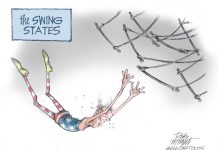Indiana is not a referendum state. Hoosier voters cannot gather signatures to qualify an issue to appear for an up or down vote on the ballot.
That wasn’t the case in conservative Kentucky, Kansas and Ohio when it came to abortion referendums after the U.S. Supreme Court’s ruling in June 2022 to overturn abortion rights that had been guaranteed under Roe v. Wade.
Last November, Ohio voters by a 56.6% to 43.4% verdict chose to amend the state’s constitution to give individuals the “right to make and carry out one’s own reproductive decisions,” including on abortion. Kansas voters passed by 59% guaranteeing abortion rights in 2022, just weeks after the U.S. Supreme Court negated Roe v. Wade. In other red states such as Kentucky and Montana, 52% of voters backed similar measures.
The 2022 Hoosier Survey by Ball State University’s Bowen Center found that a majority of Hoosiers surveyed (56.7%) believe abortion should be legal in all or most cases. This survey occurred after the Republican supermajorities passed the nation’s most far-reaching abortion restrictions that previous August.
The Indiana Constitution provides for a legislative process to amend the constitution. A simple majority vote is required during two successive General Assembly sessions to place a constitutional amendment on the ballot. Amendments do not require the governor’s signature to be referred to the ballot.
The disconnect here is that in 2011 and again in 2021, the Republican-controlled General Assembly drew their own maps. The window for creating an independent redistricting commission had closed the year before both reapportionments commenced. So, essentially, legislators created their own districts. They chose their own voters.
Since 2014, Republicans have had supermajorities in both the Indiana House and Senate, which is unprecedented in the state’s two century-plus history. The congressional maps, too, have been skewed. Previous reapportioned maps had created enough competitive districts that in an average decade, five to seven House seats flipped between the Republicans and Democrats. Since 2012, not a single Hoosier incumbent has lost to the other party.
At the March 11 Republican gubernatorial debate hosted by the Carmel Current, the six candidates were asked whether they support a voter-driven referendum process.
Here’s how they answered:
Former attorney general Curtis Hill: “The ballot issue works in other states; I don’t think it works here in Indiana. We have representative government and there’s a reason for that. We want to make sure our issues are fleshed out, debated out in the open. My concern about ballot issues is that sometimes it’s driven by emotions. Fortunately here in Indiana we don’t have that. We have our opportunity to pick our leadership.”
Lt. Gov. Suzanne Crouch: “We are not a referendum state. Our state reps and state senators are the ones who make the decisions. There is a process where that can end up on the ballot. But I do believe that people should have voices in government. While I would not lead an initiative to change referendums on the ballot, if a bill was passed by the General Assembly … and it would come to my desk … I would support it and sign it.”
U.S. Sen. Mike Braun: “When you do have representation of democracy, when you see what happened in Ohio and Kansas, in the case of each of them it probably didn’t exactly mirror where they might have been. I agree with the lieutenant governor, if it did pass the state legislature and it was vetted well, I would give it serious thought to signing it into law.”
Former Commerce Secretary Brad Chambers: “We are a representative form of government. It is in the constitution of our state that referendums are not allowed. I don’t think it will pass through this legislature. If it did I would seriously consider. If you look at California, they are clogged up with referendums. We don’t want to be California.”
Fort Wayne businessman Eric Doden: “We have a representative form of government and I prefer a representative form of government. We also have a citizen legislature and I would prefer they be part-time. If there was something that passed the General Assembly that would be referendum based, I would certainly consider that.”
Businesswoman Jamie Reitenour: “This is just not easy because with our government running the way that it should. Yes there are people representing us. In the U.S. there has been an enormous amount of government overreach. The government is the safest in the hands of the people.”
Then there are the Democrats. “Citizen-led ballot referendums are how voters across our country have been able to protect their rights and expand freedoms at the ballot box,” Indiana Democratic Party Chair Mike Schmuhl said. “Hoosiers deserve that right too, but Mike Braun, Brad Chambers, Suzanne Crouch, and the Republican supermajority at the Statehouse want to keep regular people out of the process to protect special interests and their gerrymandered districts.
“A Jennifer McCormick administration will fight to give you a direct voice on the issues that matter most, from reproductive freedom to workers’ rights,” Schmuhl said.
So here’s a true story. After opposing a constitutional amendment on a state lottery, a hardworking Democrat named Marc Carmichael (now running for the U.S. Senate) upset Republican Speaker J. Roberts Dailey in 1986, who had blocked that process. Two years later, Hoosier voters passed the lottery amendment with more than 60% of the vote.
Want the referendum process in Indiana? Find a head or two to roll. That will fetch the attention of the powers that be at the Statehouse.
Brian Howey is senior writer and columnist for Howey Politics Indiana/State Affairs, where this column was previously published. Find Howey on Facebook and X @hwypol. Send comments to [email protected].





